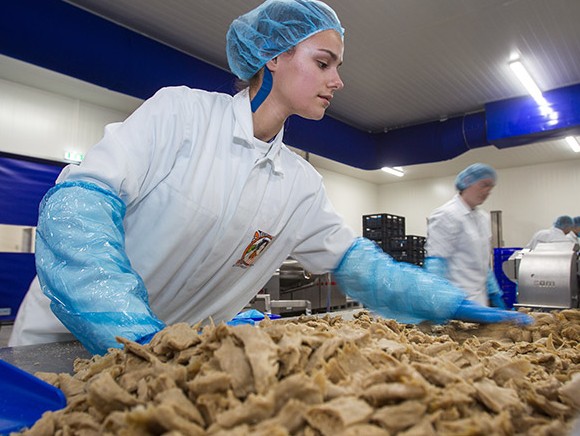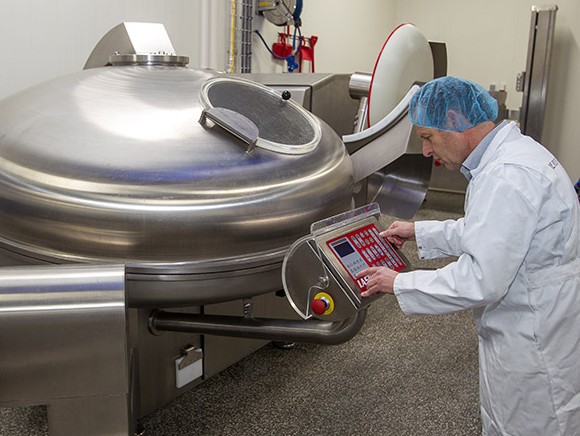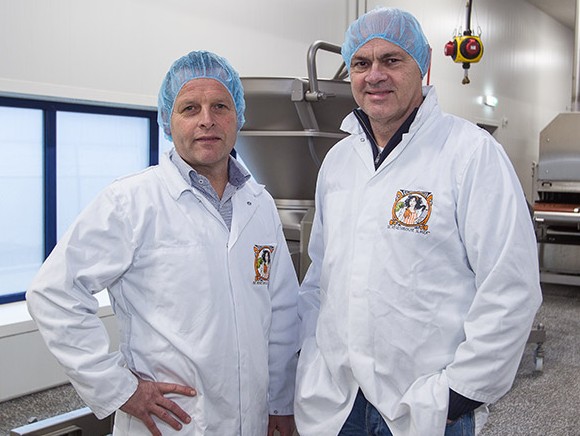
After becoming a vegetarian ten years ago, Jaap Korteweg missed meat so much that he was motivated to create the best possible meat substitutes. To accomplish this, he brought in scientists and a chef. At the end of 2017, due to increasing volume, he opened his own production location, which he will be expanding further in stages over the coming months.
"The structure is more important than the taste," says Jaap Korteweg (55) founder of the De Vegetarische Slager (The Vegetarian Butcher). "Tastes are able to be recreated—after all, meat is often marinated. However, the structure of meat is unique and diverges from all other kinds of food." That structure was, and continues to be, the greatest challenge when developing vegetarian products. In any case, that is important if your goal is to create the same taste experience as the original. Korteweg even came in third place for the Gouden Gehaktbal (Golden Meatball) chosen by De Telegraaf. Bear in mind that, of the 43 participants, 42 used meat.
Korteweg's family had a livestock farm (cattle) and later switched to crop farming. When Korteweg took over the farm, he switched to organic farming. The outbreak of swine fever in 1997 gave him the final push to become a vegetarian. That said, Korteweg missed eating meat. He missed it so much, in fact, that he decided to create vegetarian products which are as much like meat as possible. In 2010, he opened De Vegetarische Slager in The Hague. "I already had a good sustainability network thanks to my innovations in organic agriculture. I got in touch with food scientists at Wageningen University. When you engage in discussion, you come into contact with the right people quickly. The idea to recreate the structure of meat already existed, but the proper technique did not. We do this by extruding [pressing malleable material] plant proteins such as bean flour. The right combination of pressure, temperature, and movement gives it the texture of meat."
Korteweg outsourced the production process until recently, but, due to increased volume at the end of 2017, opened his own production location, which he will progressively continue to expand in the months to come. He did not want to simply continue production—he wanted to improve it—so he collaborated with a chef as well as machinery supplier Verbufa, just to name a few. Ronald Roy (54), originally a meat scientist and partly responsible for sales at Verbufa: "We came into contact with Jaap about three years ago and immediately supported his plans. We closely track national and international trends and were seeing an increase in "flexitarians" and a shift towards convenience. Impacted by the rise in CO2 emissions in livestock farming and a looming shortage of animal proteins, the food industry is changing."

According to Roy, he, Korteweg, and his team met "hundreds of thousands of times" in the years that followed. "We spent two years conducting intensive testing. We made the products over and over again, each time testing the bite and flavour, followed by modifying the machines." Verbufa ultimately supplied about ten machines used to shrink, emulsify, grind, mix, shape, and/or prepare the semi-finished product that De Vegetarische Slager creates with an extruder. Roy: "It is important for us to be involved in the product development and the processing method. Everything depends on the bite of the product. As a result of the testing, we created specific upgrades for the machines."
"The cutter was given a more powerful motor, because vegetarian products need to be processed differently," explains Roy. "The grinder was equipped with special blades and plates and the mixer is able to be tilted in order not to affect the texture. The shaping machine creates artisanal shapes, rather than having the products be punched and cut. Another important change is the introduction of Formcook's Combi Cooker with Teflon, which had to replace the frying process. This gives products a hand-crafted look and feel, because the cooking process involves less fat.
Roy also became involved in choosing the location and recommended that Korteweg should designate a technical partner for construction matters and the logistics layout of the new property. Korteweg had no experience with production and had to start from the ground up. "I like to compare myself with Tesla," says Korteweg. "They didn't have any experience with electric cars, but now they lead the market. Thanks to Tesla, other brands have been forced to produce electric cars. I see that happening in our market, too. More and more (meat) producers are creating vegetarian meat substitutes. That is why we, along with several of our big partners in the food industry, have been working on a steak machine for years. There is a lot of interest in it."
Are the machines currently very different for meat substitutes when compared to real meat? "No," says Roy. "We made some minor adjustments, but we do that for every producer. In theory, if Jaap leaves this space, a meat-processing business can occupy it."
"It is just like the kitchen at a Michelin-star restaurant," adds Korteweg, "the pots and pans are not significantly different from those at your standard cafe. However, they are used differently, so your end result is different."

For the time being, Korteweg tells us that the machine supplier is still involved: "They have gone above and beyond simply supplying machinery and have contributed to the total solution. We currently have 40 staff members, 10 of which are involved in production. In the months to come, will we expand further and Verbufa will support us in that process from a technological standpoint. Furthermore, we will be increasing our product range. For instance, our products will also be used in salads and to create ready-to-eat meals. In ten or fifteen years, I'm hoping that fifteen to twenty percent of the meat market will be plant based. That is the tipping point, which I think will push 80 percent of consumers into eating plant-based meat substitutes in ten to twenty years. My goal is to show meat lovers that they don't need to miss the meat."
Source: ©Peter Roek